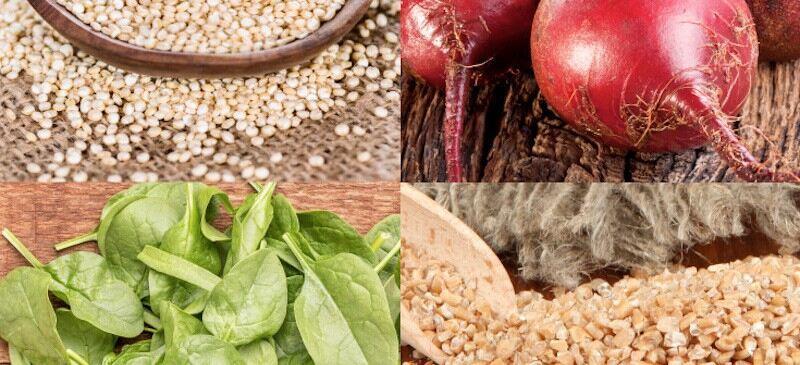A Comprehensive Guide to Understanding Betaine
Feb 10, 2024 By Madison Evans
Derived from beets, spinach, and whole grains, betaine is a naturally occurring compound. It possesses remarkable potential to foster holistic health. Its diverse benefits have garnered significant attention. This article will explore the multifaceted aspects of betaine, illuminating its advantages, delineating its applications, and uncovering potential risks.
1. Betaine Benefits
The myriad advantages of betaine are unveiled as it is a multifaceted compound. Research implies that betaine may play a crucial role with potential significance in liver function support and homocysteine metabolism aid, an associated marker for cardiovascular health. Furthermore, it demonstrates anti-inflammatory properties which could contribute to decreased body inflammation. For its association with enhanced exercise performance and muscle gain, athletes might be interested in betaine. The exploration of these benefits offers valuable insights. It suggests the incorporation of betaine into a comprehensive health regimen, an action that could potentially elevate an athlete's overall physical capacity.
Studies delve deeper into the role betaine may play a pivotal role in liver function, potentially even preventing fatty liver disease. Its capacity to regulate fat metabolism and bolster the liver's detoxification processes underscores its extensive impact on overall liver health. Furthermore, by influencing homocysteine metabolism. Not only does it confer benefits upon the cardiovascular system but also implies potential advantages for cognitive health, an impressive dual-action effect indeed. The multifaceted nature of betaine highlights its potential. It can act as a holistic contributor to overall well-being.
- Consideration: It's advisable to consult with a healthcare professional before incorporating betaine supplements, especially for individuals with existing medical conditions.
- Note: The benefits of betaine extend beyond physical health, with emerging research exploring its potential impact on cognitive function.
2. Uses of Betaine

In various contexts, betaine applies its inherent benefits. In skincare specifically, it promotes moisture retention and combats dryness. Certain cosmetics underscore the potential of maintaining skin health through their presence. Agriculture also harnesses the utility of betaine, employing it as a vital component in plant growth promoters. Thus, understanding Betaine's diverse applications leads to its integration into daily life. This not only enhances personal well-being but also encompasses broader environmental considerations.
Betaine, beyond its skincare applications, crucially contributes to the health of scalp and hair in hair care products. Its hydrating properties, by preventing dryness and enhancing texture, render it an invaluable ingredient in shampoos. Similarly, conditioners benefit from its use. Furthermore, leveraging betaine within agriculture promotes more than just plant growth. It enhances crop stress tolerance, a significant contribution towards sustainable farming practices characterized by resilience.
- Caution: While betaine in skincare is generally safe, individuals with sensitive skin should perform patch tests before using products containing higher concentrations.
- Insight: The use of betaine in agriculture aligns with environmentally friendly practices, as it promotes healthy plant growth without relying heavily on synthetic chemicals.
3. Betaine Side Effects
Betaine indeed offers a plethora of benefits. However, we must not overlook the possible detriments. Excessive consumption can result in gastrointestinal discomfort, nausea, and diarrhea may also manifest. Those with specific medical conditions such as kidney problems should exercise caution. Betaine could potentially worsen these issues. A well-informed approach to betaine utilization requires striking a balance: one must reap the benefits, yet concurrently avoid adverse effects.
Understanding individual tolerance levels is paramount. Some people may exhibit a heightened susceptibility to gastrointestinal side effects. Therefore, prudence suggests beginning with smaller doses when introducing betaine into the diet or utilizing supplements. By monitoring for any adverse reactions, an approach that is personalized and cautious, we can maximize the positive effects of betaine while minimizing potential discomfort risk.
- Important Note: Excessive intake of betaine supplements may interfere with certain medications, emphasizing the importance of consulting with a healthcare professional.
- Reminder: Adequate hydration can mitigate the risk of gastrointestinal side effects associated with betaine consumption.
4. Foods with Betaine - Incorporating Nutrient-Rich Options
Embrace foods rich in betaine to incorporate this compound into your diet, specifically, beets, spinach, and whole grains. These nutrient-dense options offer a natural means of elevating betaine intake. By crafting a diet that includes these choices, you not only boost your levels of betaine but also enhance overall nutritional well-being. Individuals, through their understanding of the culinary aspects of betaine, can empower themselves to make informed choices for a wholesome diet.
Consider incorporating beets into your salads or smoothies for a creative boost in betaine intake. This could serve as culinary inspiration. Moreover, by adding spinach, a versatile ingredient that can elevate the taste and nutritional value of various dishes ranging from omelets to pasta, you'll enjoy an effective way to harness its beneficial compounds. Whole grains like quinoa and oats, besides providing betaine, are also rich sources of fiber along with essential nutrients. They actively promote digestive health.
- Tip: Steaming or roasting vegetables like beets and spinach preserves more of their betaine content compared to boiling.
- Variety Matters: Diversifying sources of betaine ensures a well-rounded nutrient profile, promoting overall health.
5. Betaine Deficiency - Unraveling Potential Consequences
Betaine deficiency, despite its prevalence in various foods, remains uncommon. Thus, understanding the potential consequences is of utmost importance. Low levels of betaine may correlate with elevated homocysteine, a condition that detrimentally affects cardiovascular health. The importance of maintaining a balanced diet and considering dietary supplements when necessary. This is underscored by our exploration into the repercussions of deficiency.

Betaine's role in muscle protein synthesis implies that a deficiency of this nutrient could potentially affect muscle function. Thus, ensuring an adequate intake becomes crucial not only for cardiovascular health but also for sustaining optimal muscular performance. Recognizing signs of deficiency including fatigue and weakness compels you to take proactive measures addressing nutritional gaps and bolstering overall well-being.
- Awareness: Individuals following restrictive diets, such as vegan or vegetarian, may need to pay extra attention to betaine-rich foods or consider supplements.
- Prevention: Regular health check-ups can help identify potential deficiencies early, allowing for timely intervention and nutritional adjustments.
Conclusion
To conclude, betaine indeed emerges as a pivotal component in the promotion of health. Moreover, it fosters overall well-being. The myriad benefits and applications, potential side effects, and sources within foods, all these variables require thorough comprehension for individuals to form enlightened decisions that support balanced living. It’s a lifestyle rich with nourishment. Like any dietary consideration, moderation and awareness hold the key that unlocks betaine's full potential for optimal health.








